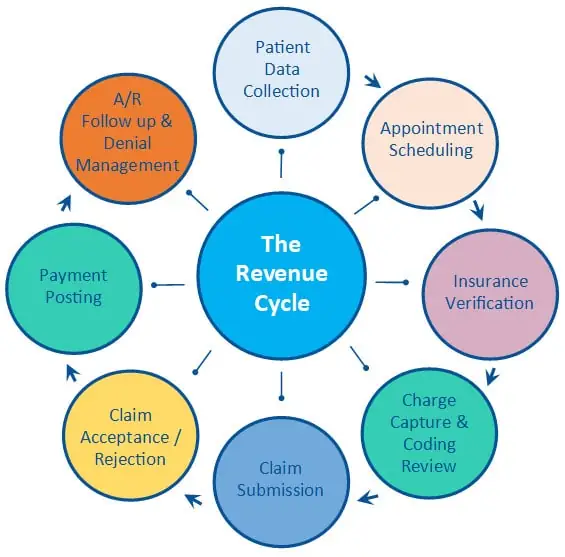Healthcare Revenue Cycle Management Defined
Revenue Cycle Management (RCM) is the collective process of administrative and clinical functions that contribute to charge capture, claims submission, and collection of patient service revenue. RCM begins with appointment scheduling and ends when the account balance is resolved through reconciliation of all third-party payments, contractual adjustments, write-offs, and/or patient payments. A well-designed RCM system streamlines the billing and collection cycles by accurately preregistering, making appointments for, and scheduling patients; collecting existing balances; creating clean claims; processing payments; and responding to insurers when a claim is denied.
The Role of a Revenue Cycle Management Partner
In the dynamic healthcare landscape, partnering with a specialized RCM provider like HealthTECH can be transformative. We don’t just manage financial details; we become a seamless extension of your team, enhancing your focus on patient care. Our partnership approach, leveraging your EMR system, ensures data control remains with you. As your billing experts, we aim to optimize revenue recovery, reduce claims denials, and improve your Days Sales Outstanding (DSO), thereby empowering your staff to help drive the growth of your practice.
For more details on the types of organizations we support, see our who we serve overview

HealthTECH RCM Services
At HealthTECH, our expert team focuses on bolstering your financial health by reducing billing errors, curtailing claim denials, and enhancing collections. We ensure compliance with evolving medical coding standards, safeguarding your revenue stream against disruptions and regulatory penalties. Our commitment is to your financial well-being.
Key Components of the Healthcare Revenue Cycle

How HealthTECH Improves DSO and Revenue

Proven Track Record of DSO Reduction
20+ Years of Excellence in Healthcare Revenue Cycle Management

Expert Trend Analysis & Metric Development

Uniting Teams with Healthy Cross-Departmental Collaboration in Revenue Cycle Management

Empowering Your Team Through Expert Training & Education
Proficient in All Leading RCM Platforms
Our team possesses extensive expertise and hands-on experience across a wide array of industry-leading applications, including:
- Allscripts/Altera
- Oracle Cerner
- Epic
- MEDITECH
- NextGen
- And more: eClinicalWorks, Methasoft. etc!
CIO or IT Director Needing Revenue Cycle Management Support?
Our specialized consultants can help you implement, optimize, and manage your healthcare IT systems efficiently.
Trusted by leading healthcare organizations across the country — Get a response within 24 hours.

